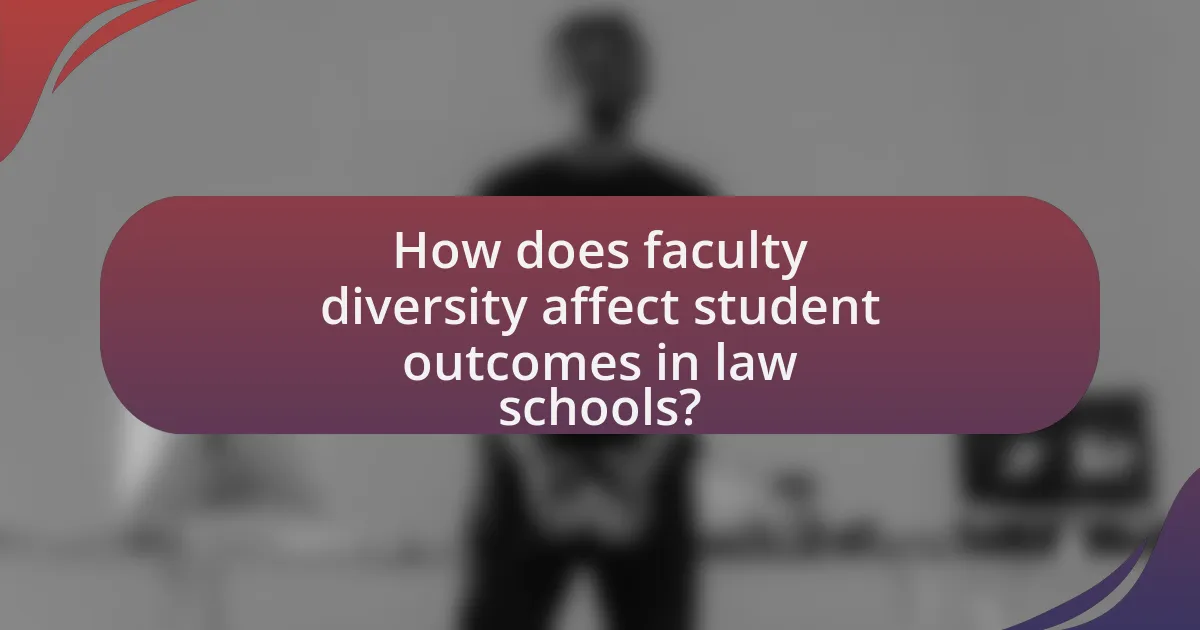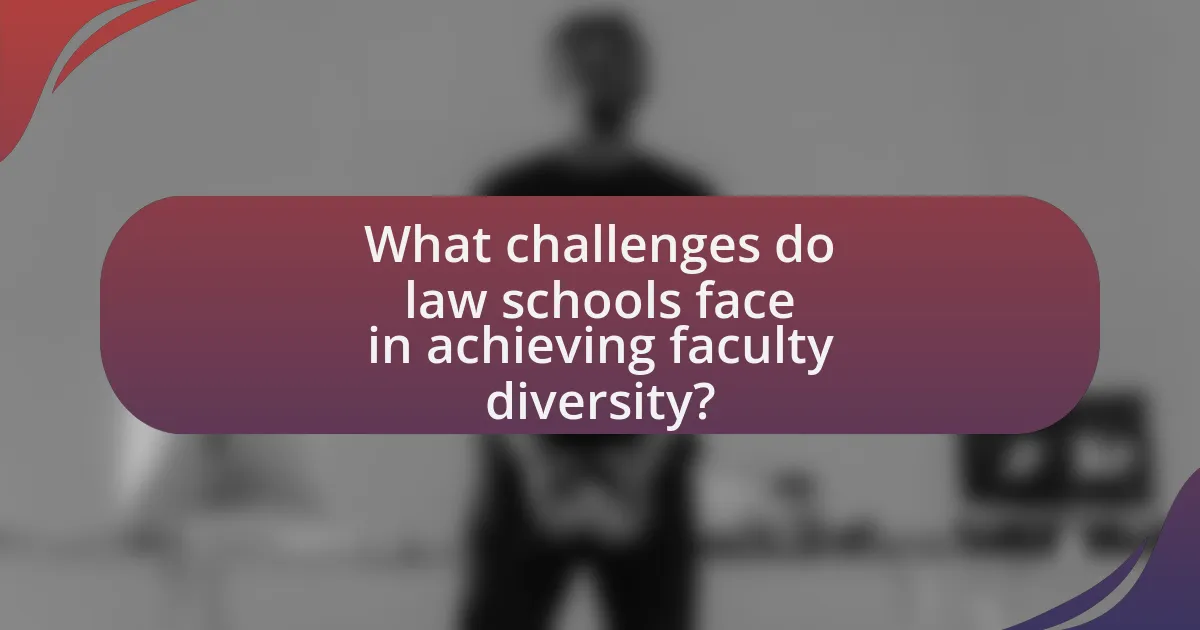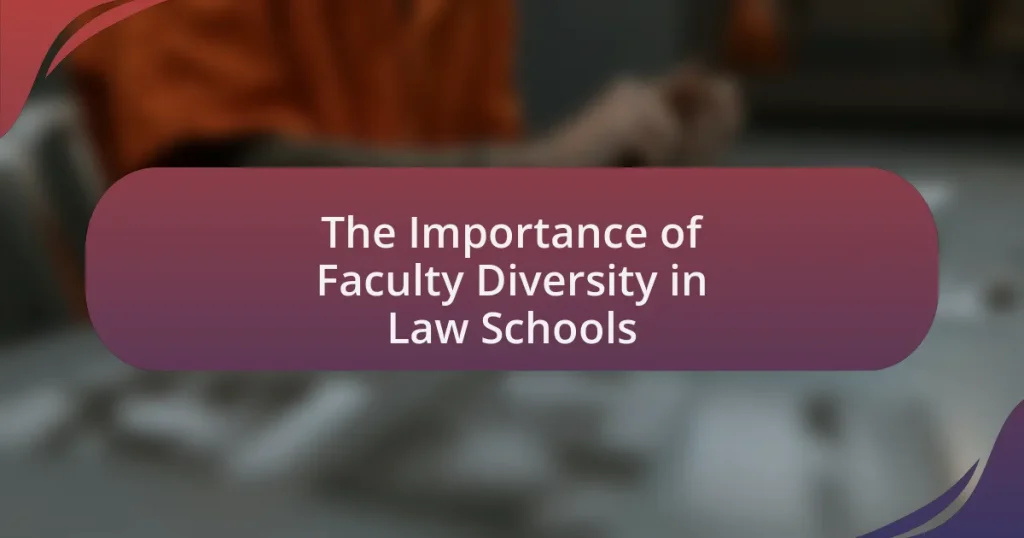Faculty diversity in law schools is essential for creating an inclusive educational environment that mirrors the diverse perspectives of society. This article examines the significance of faculty diversity, highlighting its impact on student outcomes, critical thinking, and engagement in legal education. It explores historical contexts that have shaped faculty diversity, the benefits of diverse faculty in enhancing curriculum and teaching methods, and the challenges law schools face in achieving diversity. Additionally, it discusses effective strategies for promoting faculty diversity, including targeted recruitment and mentorship programs, while addressing systemic barriers that hinder progress in this area.

What is the Importance of Faculty Diversity in Law Schools?
Faculty diversity in law schools is crucial for fostering an inclusive educational environment that reflects the varied perspectives and experiences of society. Diverse faculty members enhance the curriculum by incorporating a wide range of viewpoints, which prepares students to engage with a multifaceted legal landscape. Research indicates that diverse faculty can improve student outcomes; for instance, a study published in the Journal of Legal Education found that students perform better academically and are more likely to pursue public interest careers when taught by diverse faculty. This diversity also promotes critical thinking and encourages students to challenge their assumptions, ultimately leading to a more equitable legal profession.
Why is faculty diversity a critical issue in legal education?
Faculty diversity is a critical issue in legal education because it enhances the learning environment and prepares students for a diverse legal landscape. Diverse faculty members bring varied perspectives, experiences, and insights that enrich classroom discussions and foster critical thinking. Research indicates that students benefit from exposure to diverse viewpoints, which can improve their understanding of complex legal issues and promote inclusivity in the legal profession. For instance, a study by the American Bar Association found that diverse faculty can positively impact student engagement and retention rates, ultimately leading to a more equitable legal system.
What are the historical contexts influencing faculty diversity in law schools?
Historical contexts influencing faculty diversity in law schools include the civil rights movement, affirmative action policies, and the increasing recognition of the importance of diverse perspectives in legal education. The civil rights movement of the 1960s led to significant legal reforms aimed at dismantling racial segregation and discrimination, which in turn opened doors for minority groups in higher education, including law schools. Affirmative action policies implemented in the 1970s further promoted the recruitment of underrepresented faculty, aiming to create a more equitable academic environment. Additionally, studies have shown that diverse faculty contribute to richer educational experiences and better prepare students for a multicultural legal landscape, reinforcing the need for diversity in law school faculties.
How does faculty diversity impact the learning environment for students?
Faculty diversity positively impacts the learning environment for students by enhancing critical thinking and fostering a more inclusive atmosphere. Diverse faculty members bring varied perspectives and experiences, which enrich classroom discussions and encourage students to engage with different viewpoints. Research indicates that students exposed to diverse faculty are more likely to develop a broader understanding of complex legal issues, as highlighted in a study published in the Journal of Legal Education, which found that diverse teaching staff improved student engagement and satisfaction. Additionally, faculty diversity can serve as a role model for underrepresented students, promoting a sense of belonging and increasing retention rates in law schools.
What are the key benefits of having a diverse faculty in law schools?
Having a diverse faculty in law schools enhances educational outcomes and prepares students for a global legal environment. Diverse faculty members bring varied perspectives, experiences, and cultural insights that enrich classroom discussions and foster critical thinking. Research indicates that students benefit from exposure to different viewpoints, which can improve their analytical skills and understanding of complex legal issues. Furthermore, a diverse faculty can serve as role models for students from underrepresented backgrounds, promoting inclusivity and encouraging a broader range of students to pursue legal careers. Studies show that law schools with diverse faculty tend to produce graduates who are more culturally competent and better equipped to serve diverse communities, ultimately contributing to a more equitable legal system.
How does faculty diversity enhance the curriculum and teaching methods?
Faculty diversity enhances the curriculum and teaching methods by introducing a variety of perspectives and experiences that enrich the learning environment. Diverse faculty members bring unique insights that reflect a broader range of cultural, social, and legal contexts, which can lead to more comprehensive and inclusive course content. For instance, research indicates that diverse teaching teams can improve student engagement and critical thinking by presenting multiple viewpoints on legal issues, thereby fostering a more dynamic classroom discussion. Additionally, studies show that students benefit from exposure to diverse role models, which can enhance their understanding of the law’s impact across different communities. This multifaceted approach not only prepares students for a diverse legal landscape but also promotes equity and social justice within legal education.
What role does faculty diversity play in preparing students for a diverse legal profession?
Faculty diversity plays a crucial role in preparing students for a diverse legal profession by providing varied perspectives and experiences that enrich the educational environment. Diverse faculty members serve as role models, demonstrating the importance of inclusivity and representation in the legal field. Research indicates that students exposed to diverse faculty are more likely to engage in critical thinking and develop a broader understanding of legal issues, which is essential in a profession that serves a multicultural society. For instance, a study published in the Journal of Legal Education found that law students taught by diverse faculty reported higher levels of satisfaction and perceived relevance of their education to real-world legal practice. This evidence underscores the significance of faculty diversity in equipping future lawyers with the skills and awareness necessary to navigate and advocate within a diverse legal landscape.

How does faculty diversity affect student outcomes in law schools?
Faculty diversity positively affects student outcomes in law schools by enhancing critical thinking, promoting inclusive learning environments, and improving overall academic performance. Diverse faculty members bring varied perspectives and experiences, which enrich classroom discussions and encourage students to engage with different viewpoints. Research indicates that students taught by diverse faculty are more likely to develop a broader understanding of legal issues and demonstrate higher levels of academic achievement. For instance, a study published in the Journal of Legal Education found that law students exposed to diverse faculty reported increased satisfaction and perceived relevance of their education, leading to better retention rates and bar passage outcomes.
What evidence exists linking faculty diversity to student success?
Research indicates that faculty diversity positively impacts student success in law schools. A study by the American Bar Association found that diverse faculty members enhance the educational experience by providing varied perspectives, which fosters critical thinking and engagement among students. Additionally, a report published in the Journal of Legal Education highlighted that students of color perform better academically and feel more included in environments with diverse faculty, leading to higher retention rates. These findings demonstrate a clear link between faculty diversity and improved student outcomes in legal education.
How do diverse faculty members influence student engagement and retention?
Diverse faculty members significantly enhance student engagement and retention by fostering an inclusive learning environment that reflects a variety of perspectives. Research indicates that students from diverse backgrounds are more likely to feel a sense of belonging and connection when they see faculty who share or understand their experiences. For instance, a study published in the Journal of Higher Education found that institutions with diverse faculty reported higher retention rates among underrepresented students, as these faculty members often serve as mentors and role models. This mentorship can lead to increased academic motivation and a greater likelihood of students persisting in their studies.
What are the implications of faculty diversity on students’ career aspirations?
Faculty diversity positively influences students’ career aspirations by providing varied perspectives and role models that reflect a broader range of experiences. Research indicates that students exposed to diverse faculty are more likely to pursue ambitious career paths, as they see themselves represented in various professional roles. For instance, a study published in the Journal of Higher Education found that students of color who interacted with diverse faculty reported higher levels of motivation and confidence in their career choices. This correlation suggests that faculty diversity not only enriches the educational environment but also enhances students’ aspirations and expectations for their future careers.
How can law schools effectively promote faculty diversity?
Law schools can effectively promote faculty diversity by implementing targeted recruitment strategies that prioritize underrepresented groups. These strategies include establishing partnerships with diverse professional organizations, attending job fairs focused on minority candidates, and creating mentorship programs that support the career development of diverse faculty members. Research indicates that diverse faculty can enhance educational outcomes and foster a more inclusive learning environment, as demonstrated by a study from the American Bar Association, which found that law schools with diverse faculty reported higher levels of student satisfaction and engagement.
What strategies can be implemented to recruit diverse faculty members?
To recruit diverse faculty members, institutions should implement targeted outreach initiatives that engage underrepresented communities. These initiatives can include partnerships with minority-serving institutions, participation in diversity-focused academic conferences, and the establishment of mentorship programs aimed at supporting diverse candidates throughout the hiring process. Research indicates that institutions with proactive diversity recruitment strategies see a significant increase in the diversity of their faculty, as evidenced by a study from the American Council on Education, which found that targeted recruitment efforts can lead to a 30% increase in hiring diverse faculty.
How can law schools create an inclusive environment for diverse faculty?
Law schools can create an inclusive environment for diverse faculty by implementing targeted recruitment strategies, fostering supportive policies, and promoting a culture of respect and equity. Targeted recruitment involves actively seeking candidates from underrepresented backgrounds through partnerships with diverse organizations and networks. Supportive policies include mentorship programs, flexible work arrangements, and resources for professional development that cater to the unique challenges faced by diverse faculty. Additionally, promoting a culture of respect and equity can be achieved through training programs that address implicit bias and encourage open dialogue about diversity issues. Research indicates that diverse faculty not only enhance the educational experience for students but also contribute to a more innovative and effective academic environment.

What challenges do law schools face in achieving faculty diversity?
Law schools face significant challenges in achieving faculty diversity, primarily due to systemic barriers and recruitment practices. These institutions often struggle with a limited pool of diverse candidates, as the legal profession itself has historically lacked representation from underrepresented groups. According to the American Bar Association, in 2020, only 19% of law school faculty were from diverse backgrounds, highlighting the disparity. Additionally, unconscious bias in hiring processes can further hinder efforts to recruit diverse faculty members. Furthermore, retention issues arise when diverse faculty members encounter an unwelcoming environment or lack of support, which can lead to high turnover rates. These factors collectively impede law schools’ ability to create a diverse and inclusive faculty.
What systemic barriers exist that hinder faculty diversity in law schools?
Systemic barriers that hinder faculty diversity in law schools include biased hiring practices, lack of mentorship opportunities, and inadequate funding for diversity initiatives. Biased hiring practices often favor candidates from traditional backgrounds, limiting the pool of diverse applicants. Research indicates that law schools frequently prioritize candidates with prestigious credentials, which can disadvantage those from underrepresented groups. Additionally, the absence of mentorship programs for diverse faculty can lead to isolation and reduced retention rates, as highlighted in a study by the American Bar Association, which found that mentorship significantly impacts career advancement for minority faculty. Furthermore, insufficient funding for diversity initiatives restricts law schools’ ability to implement effective recruitment and retention strategies, perpetuating a cycle of homogeneity in faculty composition.
How do biases in hiring practices affect faculty diversity?
Biases in hiring practices significantly reduce faculty diversity by favoring candidates from specific demographic groups while disadvantaging others. Research indicates that implicit biases can lead to the prioritization of candidates who share similar backgrounds or experiences with hiring committees, often resulting in a homogenous faculty. For instance, a study published in the journal “PLOS ONE” found that faculty hiring committees often unconsciously favor male candidates over equally qualified female candidates, which contributes to the underrepresentation of women in academic positions. This lack of diversity not only affects the academic environment but also limits the range of perspectives and ideas that enrich the educational experience for students.
What role does institutional culture play in faculty diversity challenges?
Institutional culture significantly influences faculty diversity challenges by shaping the values, beliefs, and practices that govern hiring and retention processes. A culture that prioritizes inclusivity and equity fosters an environment where diverse faculty members feel valued and supported, leading to higher recruitment and retention rates. Conversely, a culture resistant to change or lacking commitment to diversity can perpetuate systemic biases, resulting in underrepresentation of minority groups. Research indicates that law schools with strong diversity initiatives and supportive institutional cultures see improved faculty diversity outcomes, as evidenced by studies showing that inclusive practices correlate with increased hiring of underrepresented faculty.
What are the best practices for overcoming challenges to faculty diversity?
To overcome challenges to faculty diversity, institutions should implement targeted recruitment strategies, foster inclusive environments, and provide mentorship programs. Targeted recruitment involves actively seeking candidates from underrepresented groups through partnerships with diverse professional organizations and academic networks. Creating inclusive environments requires ongoing training on implicit bias and cultural competency for all faculty and staff, which has been shown to improve retention rates of diverse faculty. Additionally, mentorship programs that connect junior faculty with experienced mentors can enhance professional development and support, leading to greater job satisfaction and commitment to the institution. Research indicates that law schools with diverse faculty not only improve educational outcomes for students but also contribute to a more equitable legal profession.
How can law schools implement effective mentorship programs for diverse faculty?
Law schools can implement effective mentorship programs for diverse faculty by establishing structured mentorship frameworks that pair experienced faculty with diverse junior faculty members. These frameworks should include clear objectives, regular meetings, and resources tailored to the unique challenges faced by diverse faculty, such as navigating institutional culture and accessing professional development opportunities. Research indicates that mentorship significantly enhances retention and career advancement for underrepresented faculty, as evidenced by a study published in the Journal of Higher Education, which found that mentorship programs increased job satisfaction and reduced turnover rates among diverse faculty by 30%.
What policies can be adopted to support diversity initiatives in law schools?
Law schools can adopt several policies to support diversity initiatives, including implementing holistic admissions processes that consider a range of factors beyond standardized test scores, such as personal experiences and backgrounds. This approach has been shown to increase the enrollment of underrepresented groups, as evidenced by studies indicating that diverse student bodies enhance educational outcomes and foster a more inclusive environment. Additionally, law schools can establish mentorship programs that connect students from diverse backgrounds with faculty and alumni, which has been proven to improve retention rates and academic success among these students. Furthermore, creating diversity training programs for faculty and staff can help cultivate an inclusive culture, as research indicates that such training increases awareness and reduces biases in academic settings.
What practical steps can law schools take to enhance faculty diversity?
Law schools can enhance faculty diversity by implementing targeted recruitment strategies that focus on underrepresented groups. These strategies include establishing partnerships with diverse professional organizations, attending job fairs that cater to minority candidates, and creating mentorship programs for prospective faculty from diverse backgrounds. Research indicates that diverse faculty can improve educational outcomes and foster a more inclusive environment, as seen in studies showing that diverse teaching staff positively impacts student engagement and success rates. Additionally, law schools should evaluate their hiring processes to eliminate biases and ensure equitable opportunities for all candidates, thereby promoting a more diverse faculty.



